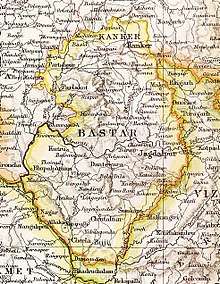Kanker State
Kanker State (Hindi: कांकेर) was one of the princely states of India during the period of the British Raj. Its last ruler signed the accession to the Indian Union in 1947.
| Kanker State कांकेर रियासत | |||||||
|---|---|---|---|---|---|---|---|
| Princely State of British India | |||||||
| 2nd century–1947 | |||||||
 Flag | |||||||
 Kanker State in the Imperial Gazetteer of India | |||||||
| Area | |||||||
• 1901 | 3,701.09 km2 (1,429.00 sq mi) | ||||||
| Population | |||||||
• 1901 | 103,536 | ||||||
| History | |||||||
• Established | 2nd century | ||||||
• Accession to the Union of India | 1947 | ||||||
| |||||||

Kanker State was located north of Bastar State and, except for the valley of the Mahanadi in its eastern part, it consisted mostly of hills covered by forests in which teak (Tectona grandis), sirsā (Dalbergia latifolia), śāl (Shorea robusta) and bījāsāl (Pterocarpus marsupium) predominated. The state had 63,610 inhabitants in 1881 and 103,536 in 1901, more than half of which were Gonds. Kanker town in Kanker District, Chhattisgarh, was the capital of the state and the see of the Raja's residence. The languages spoken in the state were mainly Chhattisgarhi and Gondi.[1]
History
The early history of the state is obscure. According to tradition Kanker was founded in the early 2nd century by Raja Satkarni of the Satavahana dynasty.[2] The state was occupied by the Marathas of Nagpur in 1809 and the Raja of Kanker was deprived of its power. In 1818, following the defeat of the Maratha Empire and when the Nagpur kingdom became a British protectorate, local rule was restored by the British authorities on payment of a tribute of Rs 500. The tribute imposed on Kanker State was remitted in 1823.[1]
At the time of the British Raj Kanker was one among the 26 feudatory states of the Chhattisgarh States Agency. The state's accession to the Indian Union was signed by its last ruler Bhanupratap Deo on 15 August 1947.[3]
Rulers
The Rajas of the princely state were:[3]
- .... – 1729 Ghoor Sai Deo (d. 1729)
- 1729–1775 Harpal Deo (d. 1775)
- 1775 – .... Dhiraj Singh Deo
- .... – .... Ram Raj Singh Deo
- .... – 1802 Shyam Singh Deo
- 1802–1809 Bhup Deo (1st time) (d. 1839)
- 1809–1818 occupied by Nagpur
- 1818–1839 Bhup Deo (2nd time) (s.a.)
- 1839–1853 Padma Deo (d. 1853)
- 5 December 1853 –May 1903 Narhar Deo (b. 1850 – d. 1903)
- 9 May 1903 – 8 January 1925 Lal Kamal Deo (b. 1873 – d. 1925)
- 8 January 1925 – 15 August 1947 Bhanupratap Deo (b. 1922 – d. 1969)
See also
- Eastern States Agency
- Kanker District
- Chhattisgarh
References
- Imperial Gazetteer of India, v. 14, p. 402.
- Hunter, Sir William Wilson. The Imperial Gazetteer of India. London: Trübner & co., 1885
- Princely States of India K-Z
External links
